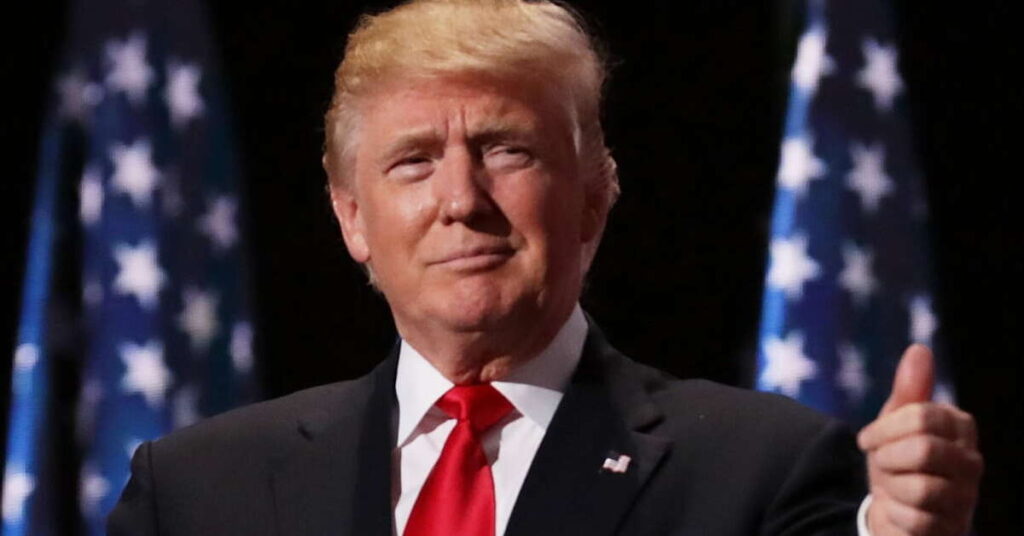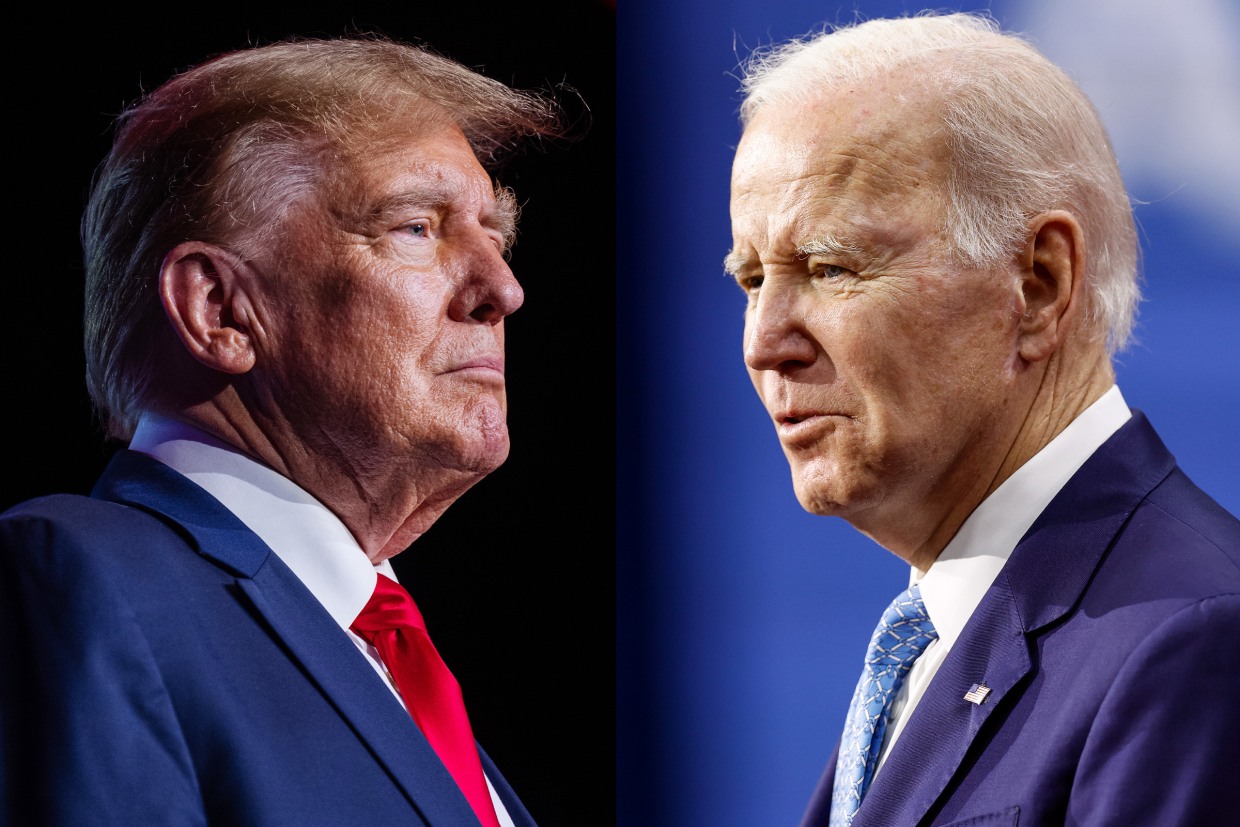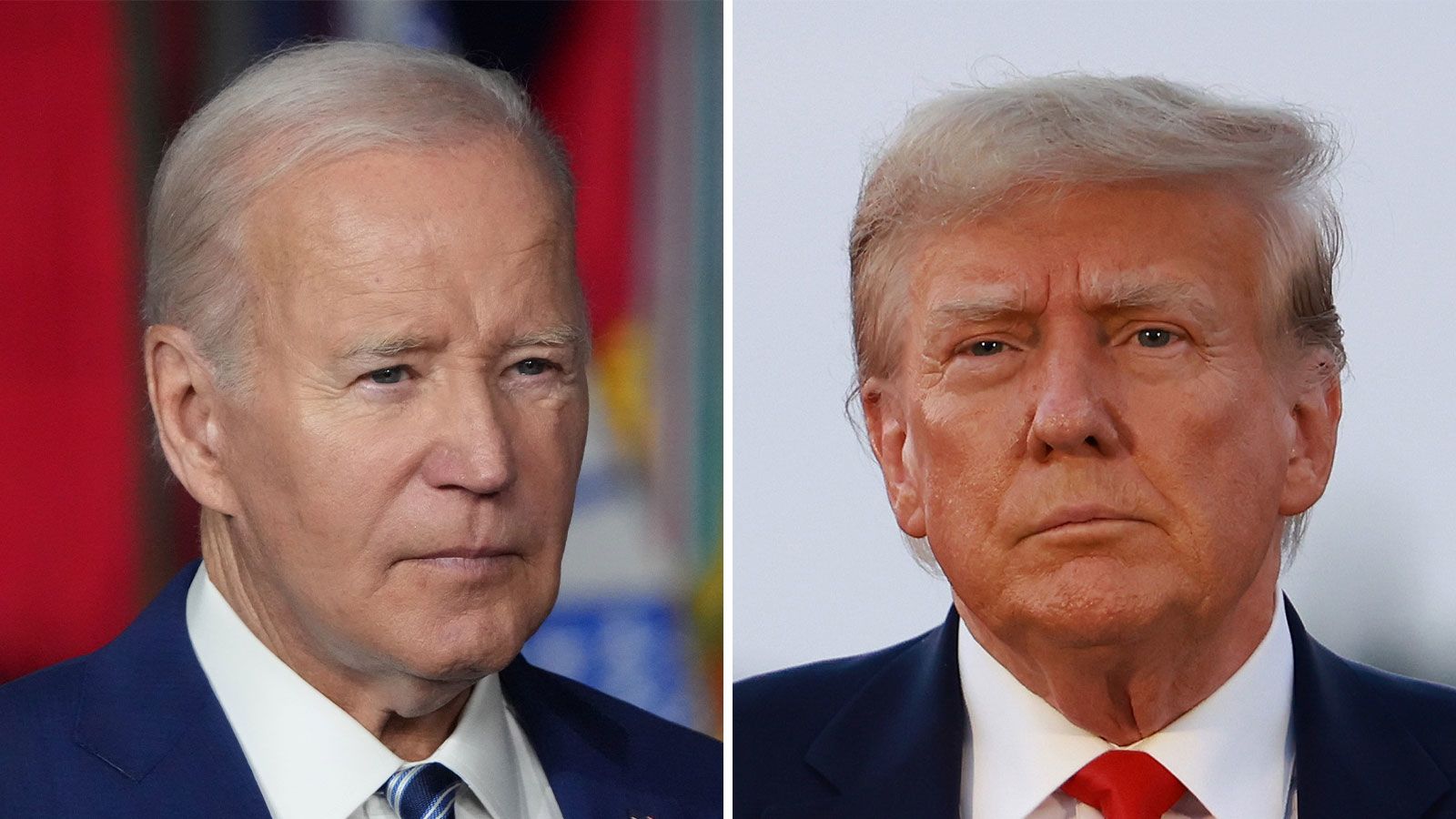“New Poll: Trump and Biden Locked 50-50 in Key States”
President Donald Trump and formerPresident Joe Biden are nearly tied among voters nationwide and in pivotal swing states, according to a new poll conducted by CBS News and YouGov. This comes less than two weeks after Trump’s guilty verdict in his New York hush money case, further intensifying the already heated political climate.
The poll, released on Sunday, indicates that 49% of voters across the country would likely support Biden at this point in the election, while 50% would vote for Trump. These figures highlight the deeply polarized nature of the American electorate, with both candidates receiving nearly equal levels of support on a national level. The margin of error for the poll is +/- 3.8 percentage points, making the race effectively a statistical tie.
In the battleground states, which are crucial for determining the outcome of the election, the numbers are similarly close. According to the poll, 50% of voters in these key states would likely vote for Biden, while 49% would support Trump. The battleground states included in the poll were Arizona, Georgia, Michigan, Nevada, North Carolina, Pennsylvania, and Wisconsin. These states are often seen as the primary battlegrounds in presidential elections due to their history of swinging between Democratic and Republican candidates.
The timing of the poll is particularly notable, as it was conducted from June 5 to June 7, just days after a Manhattan jury convicted Trump of falsifying business records in an effort to influence the 2016 election. Despite this legal setback, Trump’s support among his base appears largely unaffected. The poll found that 71% of voters who are likely to support Trump this fall said the guilty verdict was not a factor in determining their vote. This suggests that Trump’s core supporters remain steadfast in their loyalty, regardless of the legal challenges he faces.
Moreover, the poll reveals a significant divide in perceptions of the guilty verdict along partisan lines. Eighty percent of Republicans polled believe that Trump was charged because of directions from the Biden administration. This belief persists despite the lack of evidence that the president or other administration officials targeted Trump. The perception of political motivation behind the charges underscores the deep mistrust and division that characterizes contemporary American politics.
On the other hand, the poll also highlights the motivations of Biden’s supporters. Fifty-four percent of voters planning to support Biden in the fall said the primary reason for their vote is to oppose Trump. This indicates that a significant portion of Biden’s support is driven by anti-Trump sentiment rather than strong enthusiasm for Biden himself. The dynamic of voting against a candidate rather than for one is a recurring theme in modern elections, reflecting the polarized and often negative nature of political campaigns.
The poll’s findings have significant implications for both campaigns as they strategize for the upcoming election. For Biden, the narrow lead in battleground states suggests that his campaign will need to focus heavily on these areas to secure victory. The fact that a large portion of his support is motivated by opposition to Trump means that mobilizing voters who are passionate about preventing a Trump presidency will be crucial. This could involve highlighting the risks and consequences of a potential second Trump term, as well as emphasizing the accomplishments and future plans of the Biden administration.
For Trump, the results indicate that his base remains solidly behind him despite his legal troubles. However, the close numbers also suggest that he will need to broaden his appeal to win the election. This might involve addressing concerns from undecided voters and those who may be swayed by economic or policy issues. The perception of being unfairly targeted by the Biden administration could also be leveraged to galvanize his supporters and attract sympathy from voters who are wary of perceived political persecution.
The poll also sheds light on the broader political landscape and the issues that are likely to dominate the election discourse. The fact that Trump’s guilty verdict has not significantly impacted his support suggests that legal issues may not be a decisive factor for many voters. Instead, other issues such as the economy, healthcare, and national security are likely to play a more prominent role in shaping voter preferences.
Additionally, the belief among a significant portion of Republicans that the charges against Trump were politically motivated indicates that issues of trust in government and the integrity of the legal system will be central to the campaign. Both candidates will need to address these concerns and articulate their visions for restoring faith in American institutions.
The poll’s methodology also provides important context for understanding the results. The inclusion of an oversample in key battleground states ensures that the data accurately reflects the views of voters in these critical areas. This approach allows for a more nuanced analysis of voter sentiment in states that are likely to determine the outcome of the election.
Overall, the poll underscores the highly competitive nature of the upcoming election and the deep divisions within the American electorate. With both Biden and Trump nearly tied nationally and in key swing states, the race is shaping up to be one of the most closely contested in recent history. As both campaigns ramp up their efforts, the strategies they employ and the issues they prioritize will be crucial in determining the final outcome.
In the coming months, voters can expect to see intense campaigning, with both candidates seeking to sway undecided voters and solidify their bases. The close numbers also suggest that every vote will matter, making voter mobilization efforts particularly important. As the election draws closer, the dynamic and evolving political landscape will continue to shape the strategies and messaging of both campaigns.
When it comes to different voter demographics, Biden picked up support from 81% of Black survey respondents in the CBS News poll, compared to Trump’s 18%. Among women polled, 54% said they are planning to back Biden this fall, while 45% indicated they are planning to vote for Trump.
In contrast, Trump leads among voters over 65, with 58% supporting him compared to Biden’s 41%. Additionally, 64% of white voters without a college degree support Trump, while 36% favor Biden, according to the poll released Sunday.
One of the most striking findings from the poll is the overwhelming support for Biden among Black voters. According to the survey, 81% of Black respondents indicated their intention to vote for Biden, compared to just 18% for Trump. This significant margin underscores the Democratic Party’s continued stronghold on this demographic, which has historically leaned towards Democratic candidates. The high level of support for Biden among Black voters is likely influenced by several factors, including his administration’s focus on racial justice, police reform, and efforts to address systemic inequalities.
Biden’s vice-presidential pick, Kamala Harris, the first Black and South Asian woman to hold the office, may also contribute to this strong support. Her presence on the ticket represents a milestone for representation and may resonate with Black voters. Additionally, the Democratic Party’s policies on issues such as healthcare, economic opportunities, and voting rights are critical factors that align with the interests and concerns of Black communities.
The poll also highlights a notable gender gap in voter preferences. Among women, 54% said they are planning to support Biden, while 45% indicated their intention to vote for Trump. This 9-point lead for Biden among women reflects a broader trend seen in recent elections, where female voters have shown a preference for Democratic candidates.
Several issues may contribute to this gender gap. Biden’s stance on reproductive rights, healthcare, and childcare are likely appealing to many female voters. His administration’s efforts to address gender pay equity and support for family leave policies also resonate with women who prioritize these issues. In contrast, Trump’s rhetoric and policies, which have often been perceived as dismissive of women’s concerns, may alienate some female voters.
Moreover, the handling of the COVID-19 pandemic and its impact on families and working mothers could be a significant factor influencing women’s voting decisions. Biden’s approach to managing the pandemic, including support for vaccination and economic relief measures, might be viewed more favorably by women who have been disproportionately affected by the pandemic’s economic fallout.
In contrast to his support among Black voters and women, Biden faces a significant challenge among older voters. The poll indicates that Trump leads Biden among voters over the age of 65, with 58% supporting Trump compared to 41% for Biden. This 17-point lead highlights a crucial demographic where Trump has maintained a strong base of support.
Older voters often prioritize issues such as Social Security, Medicare, and healthcare, areas where Trump has positioned himself as a defender of senior citizens’ interests. His administration’s policies and rhetoric on protecting Social Security and Medicare, despite criticisms and concerns about proposed cuts, seem to resonate with older voters. Additionally, Trump’s focus on law and order and conservative values may appeal to this demographic, which tends to lean more conservative.
However, Biden has made efforts to appeal to older voters by emphasizing his commitment to protecting and expanding Social Security, lowering prescription drug costs, and improving healthcare access. His challenge will be to effectively communicate these policies and convince older voters that his administration will better serve their needs.
The poll also reveals a significant educational divide among white voters. Sixty-four percent of white voters without a college degree support Trump, while 36% favor Biden. This 28-point gap highlights a demographic that has been a key part of Trump’s base since his 2016 campaign.
White voters without college degrees often prioritize issues such as job security, the economy, and immigration. Trump’s focus on manufacturing jobs, trade policies, and his stance on immigration likely resonate with this group. His populist rhetoric and promises to bring back jobs and protect American industries appeal to voters who feel left behind by globalization and economic shifts.
Read More:Migrants Flood Border, Ignoring Crackdown:10 Signs
Biden’s challenge with this demographic is to address their economic concerns and present his policies as beneficial to their livelihoods. His administration’s infrastructure plan, efforts to create jobs in renewable energy sectors, and focus on improving healthcare access are potential areas where he could make inroads with this group. However, overcoming the strong cultural and political appeal Trump has with these voters will be a significant hurdle.
Another factor influencing voter preferences is Trump’s recent legal troubles. Less than two weeks before the poll was conducted, a Manhattan jury convicted Trump of falsifying business records to influence the 2016 election. Despite this, the poll indicates that 71% of Trump supporters are not swayed by the guilty verdict and continue to support him.
This steadfast support suggests that Trump’s base is highly resilient and deeply loyal, viewing the legal issues as politically motivated attacks rather than disqualifying actions. Eighty percent of Republicans polled believe that Trump was charged because of directions from the Biden administration, reflecting a significant level of distrust in the justice system and the belief that Trump is being unfairly targeted.
The poll also sheds light on the motivations of Biden’s supporters. Fifty-four percent of voters planning to support Biden in the fall said the primary reason for their vote is to oppose Trump. This indicates that anti-Trump sentiment is a strong driving force behind Biden’s support. Many voters who are dissatisfied with Trump’s policies, behavior, and rhetoric see Biden as a necessary alternative to prevent a second Trump term.
The close numbers and demographic divides highlighted in the poll have significant strategic implications for both campaigns. Biden’s campaign will need to focus on maintaining and mobilizing support among Black voters and women while making inroads with older voters and white voters without college degrees. Highlighting his administration’s achievements, such as the economic recovery, COVID-19 response, and infrastructure investments, will be crucial.
Trump’s campaign, on the other hand, will aim to solidify his base among older voters and white voters without degrees while attempting to broaden his appeal to other demographics. Emphasizing his economic policies, law and order stance, and criticism of the Biden administration will likely be central to his strategy.
Both campaigns will need to navigate the highly polarized and contentious political landscape, addressing voter concerns and effectively communicating their messages. The close race and deeply divided electorate suggest that every vote will matter, making voter mobilization efforts particularly important.
As the election approaches, the evolving dynamics and shifting voter preferences will continue to shape the strategies and messaging of both campaigns. The poll’s findings underscore the critical role of voter demographics in determining the outcome of the election and the importance of addressing the diverse concerns and priorities of the American electorate.





